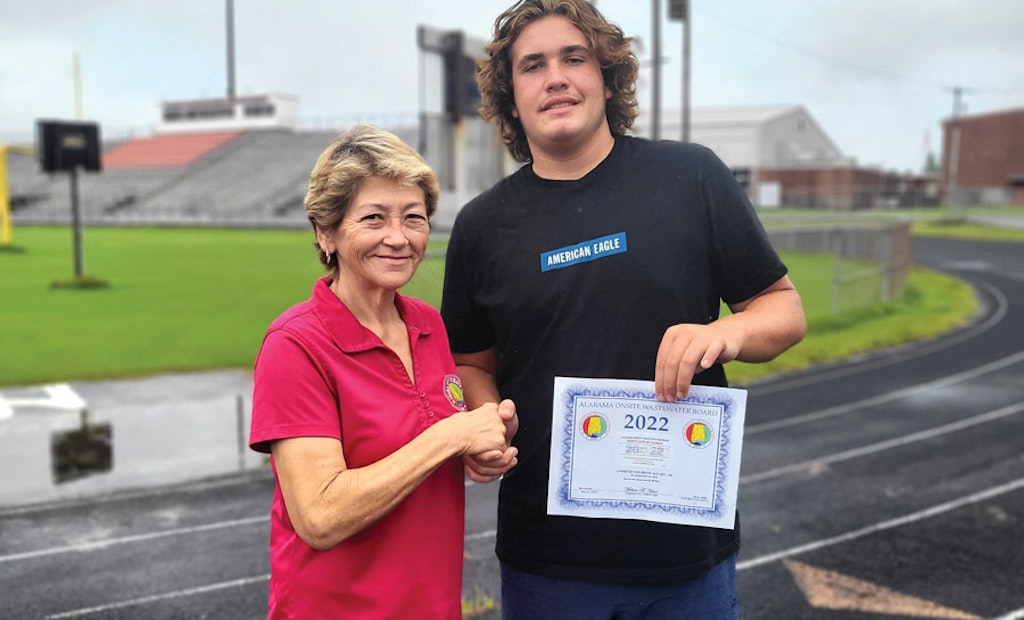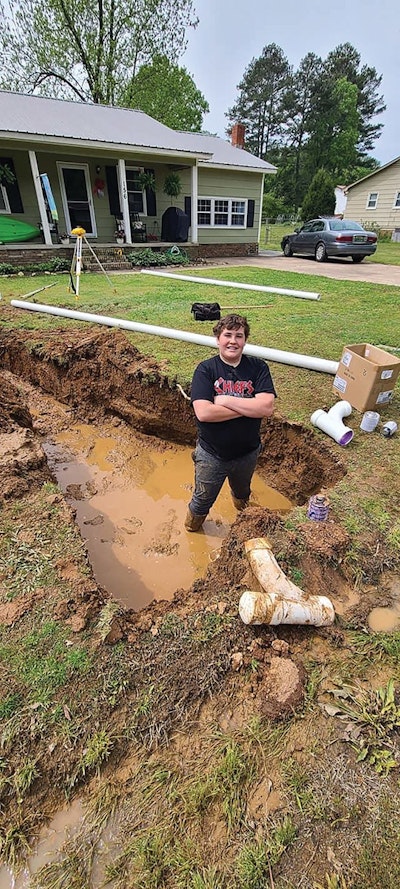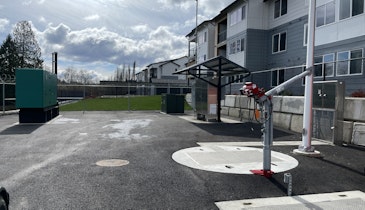
Melissa Hines of the Alabama Onsite Wastewater Board, presents C.J. Gulley with his basic installer certificate of license. (Photos courtesy of Chris Gulley)
Interested in Education/Training?
Get Education/Training articles, news and videos right in your inbox! Sign up now.
Education/Training + Get AlertsAs the average age of installers across the country creeps higher, many contractors face the prospect of creating a complex succession plan to either make sure their family business is seamlessly passed on or maintains value to sell to a new owner. Chris Gulley, owner of Gulley Construction in Bridgeport, Alabama, identified a serious shortcoming in his own succession plan recently — the fact that he was the only installer license holder for his business.
In Alabama, the individual holds the license, not the company, so licensing isn’t passed along with the business or to other family members when someone dies. Gaining all the necessary installer licensing to work on a variety of septic systems takes time, and if your lone certified installer is out of commission or passes away, the machines stop running and the income stops coming. So Chris sent his wife, Alyson, and his son, C.J., to the University of West Alabama to start the five-year process to obtain the highest level of installing licensure recognized by the state. They went through the four-day training for the basic installer certification and then passed the exam at the state licensing office in Montgomery. As a result, C.J. at age 16 became the youngest licensed installer in Alabama, according to Chris.
Gaining perspective
Chris is fortunate that he learned all the nuances of the licensing program as a member of the Alabama Onsite Wastewater Board for three years, currently serving as its chairman. He also serves as District 2 director for the Alabama Onsite Wastewater Association, representing installer members in the northeast corner of the state.
“If I were to die right now, holding the Advanced 2 license, there would be no way for anyone in the family to carry on with anything but the basic license,” Chris explained. “Our money is not in basic systems. Our money is in alternative systems.”
That would leave the company allowed to install only low-flow conventional tank and drainfield septic systems, while more complex systems pushing larger flows are Gulley Construction’s bread and butter. As Chris explained it, basic systems cost $5,000 to $7,000, while he concentrates on more lucrative projects with a price tag of $20,000 to $200,000.
His demise could be financially devastating for the company — not to mention the many years of expertise that would be lost.
With their basic licenses in hand, Alyson and C.J. must put in five basic systems over a two-year period to reach eligibility to take the Advanced Level 1 course. That license allows the installer to oversee advanced system installs up to 1,800 gpd flow. In two years, the license holder must install five advanced systems to qualify for Advanced Level 2 training, which adds large projects like schools, neighborhood systems into the mix. Chris is one of about 100 Alabama installers with the most advanced license. “Advanced Level 1 is the sweet spot,” Chris said, explaining that most new and replacement systems fall under this category of certification. If all goes to plan, Gulley Construction will have licensure to continue handling the most complex system installs for many years to come. And there’s a feeling of security in that, Chris explained.
Tough regulations
“Several people wanting to retire have come to the AOWB to ask for a variance to waive the time required for their children to be able to test,” Chris recalled. That threw up a red flag for members of the board, who are now looking for a way to help these installers smooth the certification process. “The board is actually working on developing a family succession plan, a way for their immediate family heirs to fast-track to get the licenses they need to keep going.”
These rules aren’t in place to trip anyone up. Rather, the process is a way to make sure installers are qualified and have enough training to ensure the work is done properly and customers receive a consistently good product.
“Alabama has some of the toughest onsite laws and rules in the nation, which is a good thing,” Chris said. “Most other states just go through a 2-3 hour course. This four-day course and then passing an exam for licensing is taking steps to professionalize the industry.”
It also discourages fly-by-night contractors.
Chris holds a variety of plumbing and construction certifications because his company provides many related services. Some trades, plumbing for instance, require lengthy apprenticeships to ensure a well-trained workforce, and Chris believes the onsite industry in general should trend more in that direction.
Lofty goals
Chris couldn’t be more proud of the accomplishment of his can-do son, who is already working in the trenches with him as a high school junior. He has hopes for C.J. that include attending Auburn University and taking classes that would allow him to become a soil evaluator for the company down the road. For his part, the younger Gulley seems well on his way to shepherding the family enterprise for many years to come.
C.J. will continue on the certification path, but he is also working toward other lofty goals while attending North Jackson High School. He’s playing three sports, holding down first or third base on the baseball team, defensive nose guard and right tackle on the football team, and center on the basketball team. He’s hunting for a scholarship to play football for Auburn and to pursue a business degree.
But family comes first.
“My whole goal is to make my dad happy. I want to get to the point where my dad can just sit at home and when he retires, he won’t have to worry about the business,” he said. “He has worked so hard for me, and given me everything I needed to be successful in this world. I don’t know how I can thank him for it.”
C.J.’s earliest memory of working with his father was at about age 6, eating breakfast in the work truck and Chris calling him out to hold some pipe he was installing. And it hasn’t stopped since then; now he is frequently found standing in trenches shooting grade while his father is working the excavator. Between sports practices and working as a lifeguard, he’s also found time to learn how to operate every piece of equipment Gulley Construction uses.
A bright future
C.J. said the basic installer coursework and exam were challenging, but he was thankful to the other adult installers in the class who helped him through the process. He realizes few younger people want to enter the wastewater industry. The work is hard and most kids don’t want to get dirty, he says. But he sees a lot of potential ahead for installers.
“The sky’s the limit. I just try to push myself and go as far as I can,” he said.






